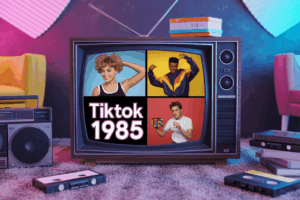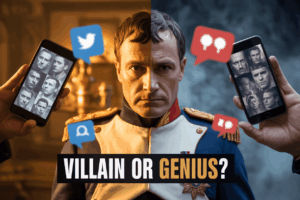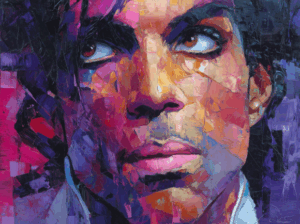You know that feeling when you’re falling down a YouTube rabbit hole at 2 AM, and the algorithm serves you something so bizarrely specific you can’t help but click? That’s how I found it: a video titled “Why 1984 Was the Best Year Ever.”
The thumbnail was a glorious collage of neon, Ghostbusters, and a chunky Macintosh computer. I scoffed. “The best? Ever? Come on.” I clicked, expecting a ten-minute nostalgia trip fueled by cherry-picked examples.
But an hour later, my mind was racing. The video made a surprisingly compelling case. But as the creator of Time Genius—a site built on AI-powered historical analysis—I couldn’t just take a YouTuber’s word for it. I had to put it to the test.
So, I fired up our own technology. I fed the data, the headlines, the cultural artifacts of 1984 into our AI engine and asked for a true, summarized “state of the world” report. What emerged wasn’t just a list of events; it was a blueprint for the modern era. A strong argument that the world we live in today was fundamentally forged in the crucible of that single, incredible year.
So, let’s settle this. Buckle up, because we’re traveling back to 1984 to see if it truly deserves the crown.
By the way, below is the video in question:
The Cultural Big Bang: A Year of Unbeatable Firsts
If you were to freeze time in 1984 and look at the cultural landscape, you’d see a constellation of icons that are still shining brightly today. This wasn’t a year of slow burns; it was a year of supernovas.
The Summer of Box Office Glory
Let’s start with the movies. 1984 was a cinematic massacre of quality. It wasn’t just about hits; it was about films that carved themselves into our collective DNA.
- Ghostbusters premiered, giving us the perfect blend of comedy, sci-fi, and supernatural terror. Who you gonna call? A franchise that’s still answering the phone four decades later.
- The Terminator introduced us to a cybernetic organism from the future named Arnold Schwarzenegger, changing action movies forever and planting the seeds for our own AI anxieties.
- Indiana Jones and the Temple of Doom had us all whispering “Kali Ma!” (and rethinking our dinner menu choices).
- Beverly Hills Cop made Eddie Murphy a global superstar and proved that a Detroit cop in LA was a recipe for comedy gold.
- Gremlins taught a generation of kids that cute, furry creatures have a very strict feeding schedule.
- The Karate Kid had us all painting fences and waxing cars, believing we could achieve anything with the right mentor.
Think about that list for a second. In one summer, we got foundational blocks of multiple genres. Today, a single one of those releases would dominate the cultural conversation for months. In 1984, they were just… Tuesday.
The Birth of the Modern Pop Icon
Music in 1984 wasn’t just evolving; it was exploding. This was the year MTV truly became a cultural force, and artists understood that the visual was now as important as the audio.
- Prince released Purple Rain, an album and film that is arguably one of the greatest artistic statements of the 20th century. It wasn’t just an album; it was an event.
- Bruce Springsteen dropped Born in the U.S.A., an album whose anthemic title track masked a deeply critical look at the American experience. It spawned seven Top 10 singles. Seven!
- Madonna’s performance of “Like a Virgin” at the first MTV Video Music Awards became an instant, iconic moment, cementing her status as the Queen of Pop.
- Michael Jackson’s hair caught fire during a Pepsi commercial. A bizarre, traumatic event that somehow only amplified his mythic status. His Victory tour with The Jacksons was the global ticket of the year.
The diversity was staggering. From the synth-pop of Howard Jones’ “What Is Love?” to the hard rock of Van Halen’s “Jump,” 1984 had a soundtrack for every possible mood. There was no algorithm curating your taste—you were at the mercy of the radio dial, and it was glorious.
The Technological Revolution: The Future Arrived Early
This is where the “best year ever” argument goes from nostalgic to genuinely prophetic. 1984 didn’t just give us great entertainment; it handed us the tools to build the 21st century.
The Dawn of the Personal Computer
On January 22nd, 1984, during the third quarter of the Super Bowl, a landmark advertisement directed by Ridley Scott aired. It depicted a dystopian world of conformity, shattered by a lone athlete hurling a sledgehammer at a giant screen. The product? The Apple Macintosh.
The ad was a statement: the future would not be commanded with cryptic text (C:>). It would be graphical, intuitive, and for everyone. The Macintosh 128K, with its built-in screen and now-legendary mouse, was a revelation. It wasn’t the most powerful machine, but it was the first one that felt like a friendly companion rather than a complex tool. It democratized computing. Every Mac, iPhone, and iPad you’ve ever used can trace its lineage directly back to this moment.
The Console Wars Begin in Earnest
While Apple was revolutionizing productivity, a Japanese company was about to conquer the living room. Nintendo released the Famicom in Japan in 1983, but it was in 1984 that they began their strategic push into the North American market, which would culminate in the 1985 release of the Nintendo Entertainment System (NES).
But 1984 was also the year a plucky newcomer entered the fray: The Sinclair QL. And a little-known company called Amstrad released the CPC 464. The battle for the hearts and minds of gamers was on, setting the stage for an industry that would eventually rival Hollywood.
In the Labs: The Seeds of the Internet
The internet, as we know it, didn’t exist. But the foundations were being poured. 1984 saw the introduction of the Domain Name System (DNS). Before DNS, accessing another computer on the nascent network required typing in a string of numbers (an IP address). DNS gave us the familiar .com, .org, and .edu suffixes. It was the phonebook for the digital age, a boring-but-brilliant innovation without which the modern web simply could not function.
Meanwhile, a researcher named William Gibson coined the term “cyberspace” in his novel Neuromancer, published in—you guessed it—1984. The vision of a consensual hallucination of data was taking shape in both fiction and reality.
The Political Arena: A World at a Pivot Point
The geopolitical landscape of 1984 was tense, defined by the tail end of the Cold War. It was a year of both immense fear and significant thawing.
The Good: A Thaw in the Cold War
After years of escalating rhetoric, 1984 saw the Soviet Union boycott the Summer Olympics in Los Angeles, a retaliatory move for the US boycott of the 1980 Moscow games. Yet, paradoxically, it was also a year of diplomatic openings. The Reagan administration began re-engaging with the Soviets, setting the stage for the landmark summits later in the decade that would ultimately lead to the end of the Cold War.
The Bad: Real-World Dystopia
George Orwell’s prophetic novel, *1984*, had loomed over the year for decades. And in some ways, it felt eerily prescient. The year was marked by events like the IRA bombing of the Grand Hotel in Brighton, targeting British Prime Minister Margaret Thatcher, and ongoing tensions that reminded the world that “Big Brother” wasn’t just a fictional concept.
The Legacy: A Global Stage
The 1984 Summer Olympics in Los Angeles were a spectacle of optimism and commercial success, a stark contrast to the financially draining 1980 Moscow games. They showed the world the power of American pop culture and corporate sponsorship, creating a model that is still used today.
The Quirky and The Undeniable: The Case Strengthens
Beyond the headlines, 1984 was just… cool. It had a vibe.
- Toys: Transformers and G.I. Joe cartoons and toys dominated Saturday mornings and Christmas wish lists. The Teenage Mutant Ninja Turtles were created in a comic book, ready to storm the world.
- TV: The Cosby Show premiered, redefining the family sitcom (its legacy is, of course, complicated today). Miami Vice brought pastel-colored, music-video aesthetics to prime time.
- Everyday Life: What did things cost? According to our Time Genius AI, the average cost of a new house was around $86,000. A gallon of gas would set you back about $1.10. A first-class stamp was 20 cents. Adjusting for inflation, that house would cost about $260,000 today—a figure that might make current homebuyers weep. That $100 in 1984 has the purchasing power of about $300 today. A stark reminder of how the economic landscape has shifted.
The Verdict: So, Was 1984 Really the Best Year Ever?
Let’s be clear: no year is perfect. 1984 had its share of problems, conflicts, and social injustices, just like any other. To declare any year “the best” is a subjective, fun, and ultimately impossible exercise.
But here’s the objective truth that our deep dive with Time Genius revealed: 1984 possesses a unique and undeniable density of cultural and technological turning points.
It was a nexus year. A moment where the analog 20th century collided head-on with the digital future. We were watching Ghostbusters in theaters while the Macintosh quietly arrived in offices. We were listening to Purple Rain on cassette while the DNS system was being built to eventually stream it to us.
The YouTube video that sparked this was onto something. It wasn’t just nostalgia; it was pattern recognition. 1984 gave us a treasure trove of art that still resonates and gave birth to the technological bedrock of our daily lives. It was a year of bold ideas, unapologetic creativity, and genuine innovation.
That’s a combination that’s hard to beat.
Your Turn to Be the Time Genius
This exploration started with a question. What question will you ask?
The beauty of history is that it’s a matter of perspective. Maybe you think the swinging sixties, the groovy seventies, or the grungy nineties had it better. And that’s the point of Time Genius.
Don’t just take my word for it. See for yourself.
I challenge you: go to Time Genius and plug in your favorite year. Or a year you know nothing about. Or the year you were born. Let our AI analyze the politics, the science, the culture, and the economics. Generate your own “news report” from the past.
Was 1969 the best year for human achievement with the Moon Landing? Was 1999 the ultimate party at the end of the millennium? You’re the historian now.
👉 Click Here to Generate Your Own AI-Powered Year Report!
Type in your year. Uncover the stories. Join the debate in the comments below: What do you think was the best year ever, and why?
Let’s get time-traveling.



